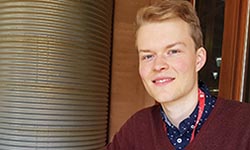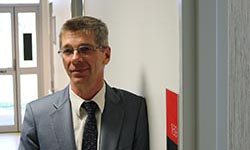 Mr Dominik Wehler (pictured left), a student with Charité Universitätsmedizin in Berlin, is collaborating with Associate Professor Herbert Jelinek in the CSU School of Community Health in Albury-Wodonga to find an alternate accurate method for diagnosing fainting spells experienced by patients without the need for extensive testing.
Mr Dominik Wehler (pictured left), a student with Charité Universitätsmedizin in Berlin, is collaborating with Associate Professor Herbert Jelinek in the CSU School of Community Health in Albury-Wodonga to find an alternate accurate method for diagnosing fainting spells experienced by patients without the need for extensive testing.
"Currently, patients who suffer an undiagnosed short fainting episode are referred to a specialist to find out if a fainting spell has been caused by low blood pressure or heart defects such as arrhythmia or previous scarring on the heart muscle.
"This testing can take up to 24 hours to gain relevant data and is undertaken with the specialist, often in metropolitan locations. This may cause major difficulties for people who live long distances from specialists."
Mr Wehler has used over 220 records gathered from residents in Albury-Wodonga and Wangaratta to develop a simple technique using only pulse rate recordings, if other tests are negative, to detect patterns that can indicate a possible cause for fainting.
"I am adapting a diagnostic computer program to improve the detection and accuracy of the underlying causes of fainting from two to 18 per cent of patients who faint, using only pulse rate recordings.
"The data for this improved test could be gathered by a general practitioner or trained health professional using simple equipment and data entered into the tool.
"If the tool indicates that a patient requires further attention, then they would be referred to a specialist."
 The study is part of Associate Professor Jelinek’s long term research in the use of electro-cardiogram (ECG) data for early detection of diseases common in regional Australia such as depression, heart disease and diabetes.
The study is part of Associate Professor Jelinek’s long term research in the use of electro-cardiogram (ECG) data for early detection of diseases common in regional Australia such as depression, heart disease and diabetes.
"I have been working with international students and researchers in this field for over 15 years now, and we are starting to get a large body of data that has led to the development of new ways to detect eye disease, heart disease and depression,’ Prof Jelinek said (pictured left).
"Having international students and researchers here at CSU has brought new and exciting ideas and solutions to the Border region and has contributed to CSU’s international reputation in the area of biomedical science."
During his three months at CSU in Albury-Wodonga, Mr Wehler is also investigating the use of a simple diagnostic tool to assess patients for diabetes using selected sections of a patient’s ECG reading.
"We are looking to develop an app where a patient wearing a smart watch could provide a short segment of their pulse rate and enough information that a regional health worker or allied health professional could use to identify possible complications of diabetes," Mr Wehler said.
Mr Wehler is due to leave CSU Albury-Wodonga in September this year, but he will continue working on the projects after returning home to continue his studies.






